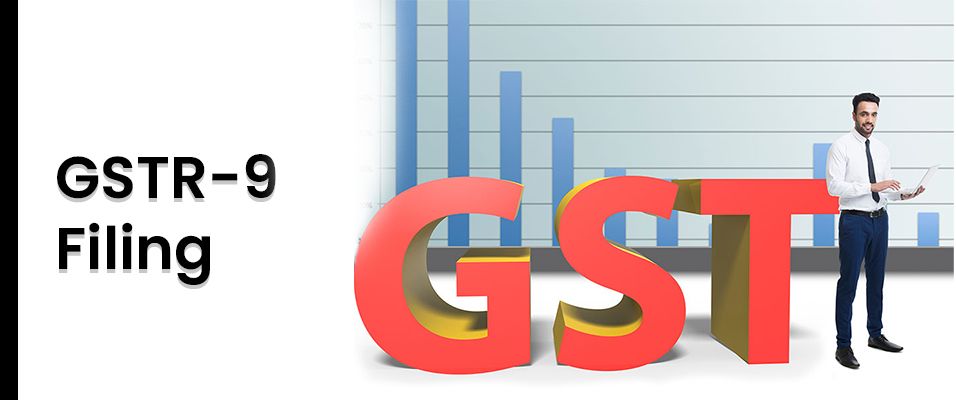GSTR-9 Filing
GSTR-9 Filing
The GST Annual Return (GSTR-9) is a total return filed annually by businesses registered under India's Goods and Services Tax (GST) regime. It contains details of all sales, purchases, input tax credits availed, and taxes paid during the financial year. The return must be filed by December 31st of the following year and is a critical compliance requirement to avoid penalties and maintain good standing with the tax authorities.

How to File GST Annual Return for 2021
Implemented in India from 1st July 2017. Over 1.3 crore businesses in India have been registered and issued GST registration under the new GST regime. The entities registered under GST must file annual returns as per the scheduled GST return due date.
GST annual return filing is mandatory for all entities with a turnover of more than two crores required to obtain GST registration, irrespective of the business activity sales or profitability during the return filing period. Hence, even a dormant business that gets GST registration must file GST returns.
What is GSTR -9 Filing?
GSTR 9 is the annual Return that is to be filed yearly by the taxpayers registered under GST.
GSTR 9 is to be filed yearly by the taxpayers registered under GST. It consists of details regarding the outward and the inward supplies made during the relevant financial year.
Before filing GSTR 9, the taxpayer must file all GSTR-1, GSTR-3B, or GSTR 4 returns. In case of over-dues, the GSTR registration holder cannot file an annual GST return.
GSTR 9 details the outward and the inward supplies made or received during the relevant financial year under CGST, SGST, and IGST. It is a consolidation of all the monthly/quarterly returns filed in that year.
Who should file GSTR 9?
All taxpayers/taxable persons registered under GST must file their GSTR 9. However, the following are NOT required to file GSTR 9:
- Taxpayers opting for composition scheme (They must file GSTR-9A)
- Casual Taxable Person
- Input service distributors
- Non-resident taxable persons
- Persons paying TDS under section 51 of the CGST Act.
GST Annual Return Due Date
The due date for filing Form GSTR-9 (Annual Return) and Form GSTR-9C (Reconciliation Statement) for the financial year 2019-2020 has been extended to 31st March 2021, based on the pandemic situation. The Government has also decided to simplify these forms by making various fields of these forms optional.
What details are required to be filled in the GSTR-9?
The GSTR-9 is broadly divided into six parts and 19 sections. Each part asks for the details that are readily available from previously filed returns and books of accounts.
This form asks for disclosure of annual sales, bifurcating between the cases subjected to tax and those not subjected to Tax.
The annual value of the inward supplies and ITC availed thereon is to be revealed.
Further, these purchases have to be classified as inputs, input services, and capital goods. Details of ITC that need to be reversed due to ineligibility are to be entered.
GST Annual Return Types
GST annual return filing can be divided into three types based on the form to be filed:
GSTR 9
The entities exceeding a turnover of 2 crores are required to file GST annual Returns in form GSTR-9.
GSTR-9A
Registered taxpayers who have opted for the GST Composition scheme are required to file GSTR-9A.
GSTR-9C
Form GSTR-9C is meant to file the taxpayers' reconciliation statement about a particular financial year. This form is a statement of reconciliation between the Annual returns in GSTR-9 and the figures mentioned in the taxpayers' Audited financial statements.
GSTR 9C applies to taxpayers who are required to obtain an annual audit of their accounts. GSTR 9C must be prepared and certified by a CA or Cost accountant. GST audit is applicable for a person having GST registration with an annual aggregate turnover of above two crores in a particular financial year.
Who should file GSTR-9A?
A GST-registered taxpayer who has opted for a composition scheme under the GST Act are required to file GSTR-9A. GSTR-9A includes all the information that is submitted by the taxpayer, furnished in the quarterly Return during a specific fiscal year.
Eligibility
Every taxpayer registered under the composition levy scheme under GST must file GSTR-9A. However, the following individuals are not required to file GSTR-9A:
- Input Service Distributor
- Non-resident taxable individuals
- Individuals who pay Tax deducted at sources (TDS) under Section 51 of the Income Tax Act.
- Casual Taxable Individuals
- E-commerce operators who pay Tax collected at source (TCS) under Section 52 of the Income Tax Act.
Who should file GSTR-9C?
Form GSTR 9C is meant for filing the reconciliation statement of taxpayers about a particular financial year. The form is a statement of reconciliation between the Annual Returns in GSTR-9 and the figures mentioned in the taxpayer's Audited Financial Statements. Given that, this CA-certified form must be filed during the filing of Annual Returns in GSTR-9 and the Audited Financial Statements. The obligation can either be completed through the GST portal or a Facilitation Centre. This article deals with the usage and need of the form.
